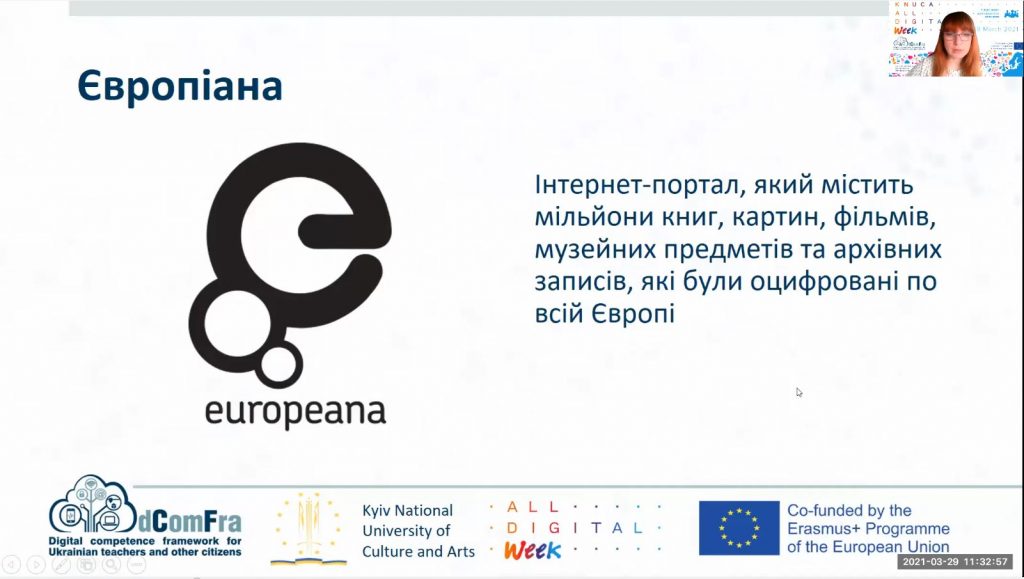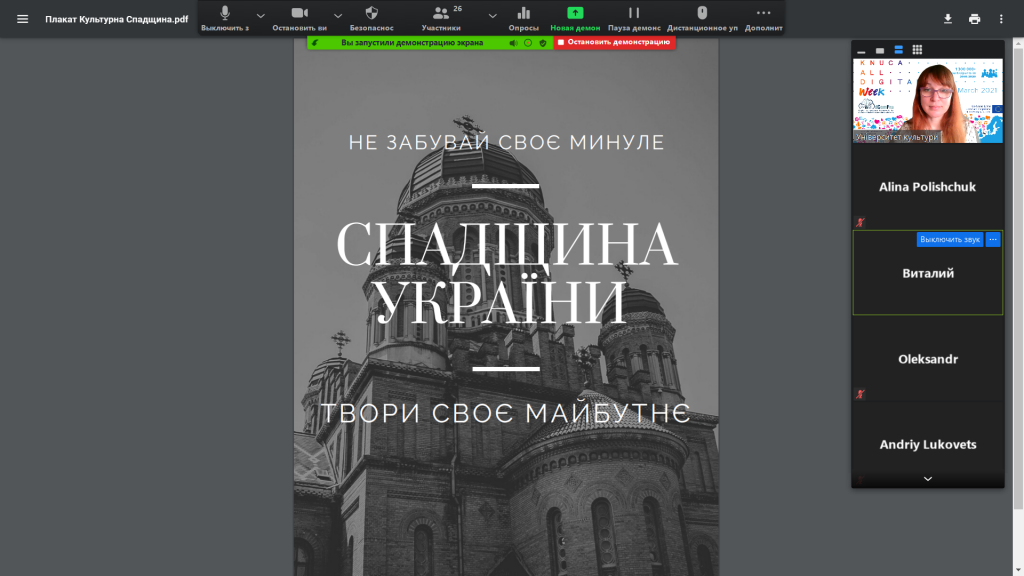The University of Culture has actively participated in the European initiative ALL Digital Week, or European Digital Literacy Week – an annual information campaign dedicated to the development of digital competencies of citizens. In 2010-2020, more than 1,300,000 participants took part in the European Digital Literacy Week.

This year ALL Digital Week had some differences compared to previous campaigns. In particular, the website of the initiative has expanded the time frame for events, which could begin on March 1 and continue to arrange until April 16, registering on the general map.

Ukraine also had its peculiarities, as this year the ALL Digital Week campaign was supported by the Ministry of Digital Transformation at the state level, thanks to the efforts of the initiative group, which included representatives of the dComFra project consortium. A communication and education campaign on digital literacy began on March 22 as part of All Digital Week. The opening of the European Digital Literacy Week took place on the same day, which was attended by representatives of KNUKiM, members of the dComFra Project Working Group Olena Tchaikovska and Maryna Tolmach.
Joining the European and national initiatives ALL Digital Week, the University of Culture organized a series of online events on digital literacy in the framework of the Digital Week KNUKiM 2021.

On March 25, the All-Ukrainian Digital Intellectual Student Battle # 150Lesya Ukrainka Forever took place, conducted by the KNUKiM Scientific Library.
The main goal of the project was to celebrate the anniversary of the poetess Lesya Ukrainka and the participation of libraries and university students in the European Week of Digital Literacy, intensification of cooperation between freelance libraries, involvement of students in studying the poet’s work with digital technologies.
The celebration of the 150th anniversary of Lesya Ukrainka was included in the UNESCO Calendar of Memorable Dates for 2020-2021.
The idea of an intellectual battle was supported by specialists of the Kharkiv regional branch of the UBA, Kharkiv State Scientific Library named after V.G. Korolenko and 5 institutions of higher education of Ukraine: Kharkiv State Academy of Culture, National Aerospace University named after ME Zhukovsky “KHAI”, Kyiv National University of Culture and Arts, Kyiv University of Culture, Scientific Library of Odesa II National University. Mechnikov, becoming co-organizers of the event. The project partner was also Ranok Corporation (Kharkiv) – one of the leaders of Ukrainian publishing brands.
In addition, on March 25, an interactive online quiz was held on the platform of the digital learning tool Kahoot, which was attended by 34 students from Kyiv, Kharkiv, Odesa, Kherson, Melitopol, Lviv, Chernihiv, Poltava, and Mykolaiv regions. The moderators of the game were libraries of higher education institutions.
The winners of the quiz received diplomas and gifts – electronic QR books of modern Ukrainian and foreign writers from the publishing house “Morning” and the Kharkiv regional branch of the Ukrainian Library Association. Diplomas were also awarded to participants who were in the top 10 players as a result of the game. Among them is a representative of KNUKiM Valeria Podrya.
Also on March 25, everyone was waiting for online training on the formation of skills for creating interactive content on the Genially service. Students of the Tourism specialty joined the event held by the KNUKiM Scientific Library in cooperation with the Faculty of Hotel, Restaurant, and Tourism Business.
Olena Skachenko, Head of the Methodological Work Sector of the Scientific Library of the Kyiv National University of Culture and Arts, developed and presented to young people a video instruction on creating interactive content.
The professional training was aimed at developing skills of working with digital learning tools, which students mastered during the creation of a personalized “Tourist Travel Map of Ukraine”, marking the locations of their own trips and systematizing them by age (trips for children, school and students). Interactive labels on the map contain photos of travel cities and text captions to identify visited tourist attractions.
Based on the results of individual works, a rating of the most active travelers was formed and the types of tourism they used were identified.
In general, the teaching methods contributed to the acquisition of digital skills by students to create interactive resources on tourism, deepen the value perception of the uniqueness of national tourism resources and increase digital literacy, which in the future young people can use in professional activities.
On March 26, the University of Culture hosted a workshop “Media Literacy and Critical Thinking: Soft Skills for Everyone”, organized by the Department of Computer Science and the Faculty of Distance Learning.
“Media literacy is a critical skill for us,” analysts say. During the lecture, Svitlana Slipchenko, Deputy Head of the VoxCheck Project, and Valeria Stepaniuk, a junior analyst at VoxCheck, informed the students how not to drown in the boundless space of information, to recognize fakes and propaganda, and where to check the facts.

VoxCheck is one of the projects of VoxUkraine, an independent and non-partisan analytical platform founded and led by a team of experienced and highly qualified economists and lawyers working in Ukraine and abroad.
During the event, experts considered the following issues:
1) Critical thinking for life and work
2) Manipulation VS critical thinking: expose logical errors
3) Media literacy – a tool against fakes
4) Who to trust? Basic sources and tools of the fact check.
An interesting continuation of the digital week at the University of Culture was the training “Skills of using an online platform for teaching” from the Department of Computer Science and the Faculty of Distance Learning, which took place on March 27. The event was dedicated to developing the skills of extended use of Moodle capabilities.

Olena Tchaikovska congratulated the participants on joining the European Week of Digital Literacy in Ukraine and spoke in detail about the #AllDigitalWeek initiative.

Marina Tolmach drew attention to the statistics on the readiness of teachers to use information technology for teaching.
In particular, Ms. Marina noted the importance of owning modern digital tools for teachers. In the practical part of the training the useful settings of the Moodle distance learning platform were considered:
how to record and evaluate student attendance
how to work with testing
how to set up an automatic calculation of grades according to your needs
how to diversify the forms of work of students on the platform.
During the training, research and teaching staff shared their experiences and were able to learn about useful settings for working with the system.
At the end of the Digital Week of KNUKiM 2021 – March 29 – the Department of Computer Science of the Faculty of Information Policy and Cyber Security invited everyone to participate in the workshop “Creating digital content from Europeana”.

The participants of the event were mainly students majoring in “Information, Archival and Library Affairs” and “Computer Science”.
Creating digital content is a process that requires inspiration, interesting resources, and digital skills. One of the key themes of 2021 was for the first time identified “Digital Cultural Heritage”. Young people were invited to get acquainted with the resources of digital cultural heritage and create different content using the information and materials found. In particular, the sites Europeana and Google Arts and Culture were presented.

As the students learned, Europeana is an online portal containing millions of books, paintings, films, museum objects, and archival records that have been digitized across Europe.
Google Arts and Culture is a non-profit initiative for collaboration with cultural institutions and artists from around the world, whose mission is to preserve and bring world art and culture online so that it is accessible to anyone and anywhere.
The theme for the content was “Women’s History Month” #WomenHistoryMonth, which annually covers the contribution of women to events in history and modern society. A separate collection has been collected on this topic on the Europeana website, which has also been useful for students to implement their projects.
On March 29, students presented works in the form of presentations, memes, posters, a collection of badges, etc., related to famous women in various fields, their quotes, as well as the theme of the struggle for women’s rights and overcoming gender stereotypes.

It should be emphasized that the KNUKiM Digital Week annually expands the geography of participants, so this year online events brought together not only young people and research and teaching staff of the University of Culture, but also other leading representatives of Ukrainian higher education institutions to deepen digital skills and professional innovation. meet the challenges of the times.

